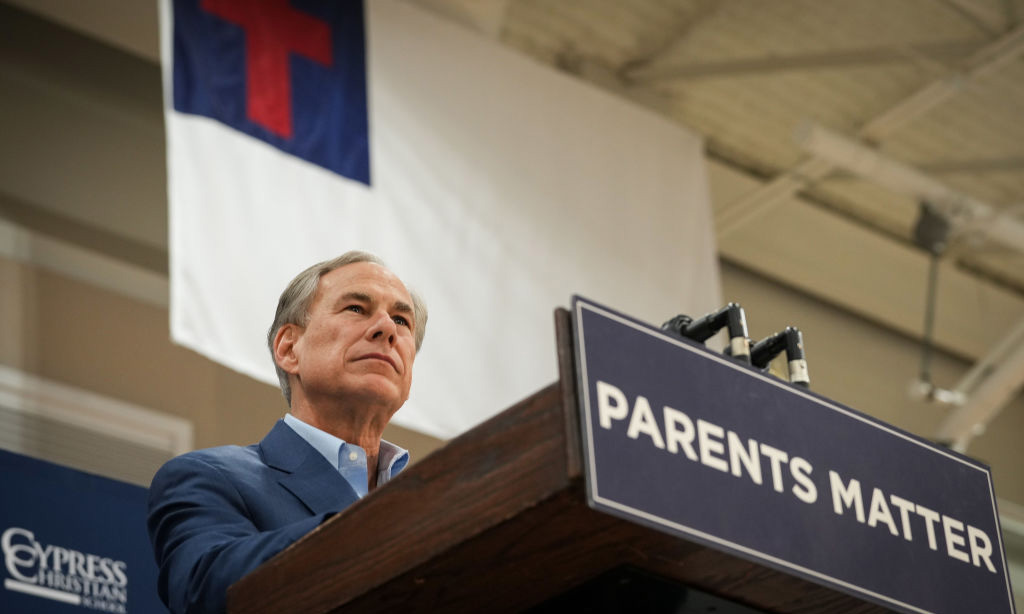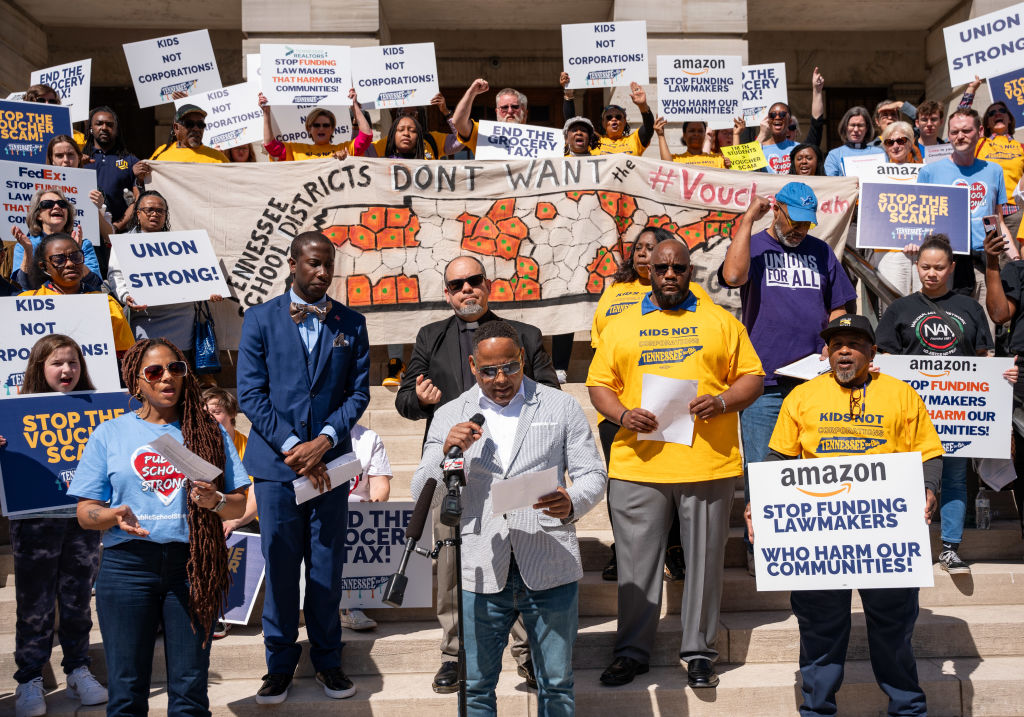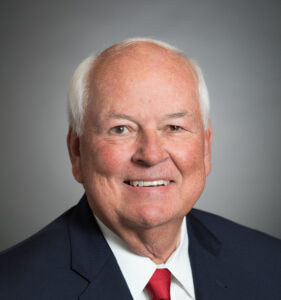GOP Groups Funnel Millions into State Races to Defeat Critics of Education Savings Accounts. Their Target: Republicans
Supporters say the cash is necessary to offset the ‘humongously large coffers’ of teachers unions. But is it fueling a Democratic backlash?

Get stories like these delivered straight to your inbox. Sign up for The 74 Newsletter
This article is part of The 74’s EDlection 2024 coverage, which takes a look at candidates’ education policies and how they might impact the American education system after the 2024 election.
A year ago, Steve Allison believed he would easily sail to reelection in the Texas House of Representatives. He’d held the seat near San Antonio since 2019, and had faithfully sided with Gov. Greg Abbott, a fellow Republican, on nearly every issue. The group Mothers Against Greg Abbott even handed Allison an “F” on its report card.
But in late 2023, Abbott began speaking out against him. With the support of other lawmakers and several political action committees, the governor began portraying Allison as weak on border security and property tax relief — two no-compromise issues for Texas GOP voters. In February, one PAC ran a campaign ad calling Allison “wrong for Texas.”
The San Antonio Express-News endorsed him as “easily the most qualified candidate in this race,” but the attacks stuck: Voters in his district showed him the door in the March 5 primary, overwhelmingly choosing Marc LaHood, a criminal defense attorney with no political experience, as the Republican nominee.

In an interview, Allison said his defeat came down to one unlikely issue: school choice, specifically his opposition to Abbott’s long-stalled effort to enact a statewide Education Savings Account to help families pay for private and homeschool expenses.
It’s a scenario that’s playing out in Texas and beyond as lawmakers, pushing to remake legislative maps, increasingly turn for assistance to groups like the American Federation for Children and the School Freedom Fund, a pro-ESA group tied to tech billionaire Jeff Yass. Yass, a well-known Pennsylvania-based school choice proponent and investor in TikTok parent company Byte Dance, has spent millions to promote ESAs.
To single us out and to focus so much by the governor on this one issue is very shortsighted.
Texas State Rep. Steve Allison
The effort has already changed the ballot this November and produced an unprecedented shift in statehouses, with lawmakers increasingly approving taxpayer support for private education. Seventeen states now have universal or near-universal ESA programs.
Whether it’s via a traditional voucher, which gives families tuition for private education, a tax credit, or a less restrictive ESA fund, the idea is increasingly finding favor in state legislatures. In Florida, families can receive 72% of what the state spends per-pupil; in Arizona, it equals 90%. The pro-school-choice group EdChoice has estimated that more than 328,000 students now take advantage of ESAs, up from 40,000 in 2022.
But many rural conservatives fear the funding won’t be useful in isolated areas where private schools are unlikely to open. In many small towns, school districts are the largest employer, making ESAs political kryptonite.
A few observers say the development also could backfire. Mark P. Jones, a political scientist at Rice University, warned that a rightward primary shift could spell defeat for Republicans in the Nov. 5 general election.
“It is possible, even after all the craziness, even after all the attacks and the millions of dollars spent, particularly by a particular TikTok owner, that you’ve got a situation where Abbott may not get his vouchers after all,” Jones said.
‘So wrong for Tennessee taxpayers’
For the moment, school choice efforts are moving full-speed ahead. FutureEd, a Georgetown University think tank, identified 118 private-school choice bills in 34 states, with most aiming to broaden options like ESAs.
The effort is playing out in states like Ohio, Iowa and, most recently, in Tennessee, where the School Freedom Fund spent an estimated $1 million against Republicans who stopped a statewide voucher in 2024. Among their targets: Sen. Frank S. Niceley, a 20-year legislative veteran who boasted a lifetime 86% score on the conservative Tennessee Legislative Report Card.
The fund painted him as “liberal Frank Niceley,” with one ad targeting his vote to give undocumented students in-state tuition benefits at Tennessee colleges, adding, “No wonder there’s an invasion.” Playing on his last name, it concluded: “Nice to illegals, but so wrong for Tennessee taxpayers.”

Niceley said in July that allowing out-of-state PACs to label the most conservative senator as a liberal amounted to trashing elections in favor of pre-determined outcomes by interest groups. “Just call up and ask ’em who they want.”
A statewide voucher, Niceley said, ran counter to Tennessee’s reputation for curbing what he called wasteful spending.
Early evidence in other states suggests that while ESAs are popular, their benefits often take the form of tuition discounts for families whose children are already in private schools. In Iowa last year, 60% of applications for the state’s ESA came from such students. In Florida, it was 69%.

Despite Niceley’s plea for frugality, in August, primary voters ousted him by double digits in favor of Jessie Seal, a public relations director for a medical facility.
Celebrating the defeat of Niceley and others, David McIntosh, a former Indiana congressman and the School Freedom Fund president, said, “Make no mistake: if you call yourself a Republican and oppose school freedom, you should expect to lose your next primary.”
McIntosh declined an interview request.
Abbott’s ‘white whale’
On the flip side, teachers’ unions are well-known for supporting both Democratic candidates and anti-school-choice legislation. In this political cycle, the National Education Association has spent $21,800,773, according to Open Secrets, a nonprofit that follows money in politics. The American Federation of Teachers has spent $3,949,330.
In Texas, anti-ESA Republicans earned support from a PAC funded by H-E-B grocery store chain heir Charles Butt. It threw in more than $4 million last winter, equal to what the School Freedom Fund spent to oppose a dozen Republicans who blocked Abbott’s voucher legislation.
Voters have rewarded the Freedom Fund’s efforts: Over the past few months, they’ve sent more than a dozen anti-ESA lawmakers packing. Abbott has persuaded a handful of others to retire rather than face difficult primaries.
Yass, the TikTok billionaire, has contributed more than $12 million in this political cycle, while Miriam Adelson, owner of the Las Vegas Sands casinos, has spent about $13 million, making the pair — residents of Pennsylvania and Nevada, respectively — Texas’ two biggest political donors.
School choice backers hope that kind of support ultimately results in a win for ESAs, a goal that has repeatedly eluded Abbott.
Jon Taylor, a political scientist at the University of Texas at San Antonio, joked that ESAs have become Abbott’s “white whale,” one of the few legislative wins he can’t seem to earn.
Jones, the Rice political scientist, noted that several red-leaning states, including Florida, Georgia and Arizona, have ESAs. Texas Republicans have enjoyed a unified government since 2003, he said, creating a kind of “dissonance” between Texas’ perception as the most conservative state and Abbott’s inability to seal the deal.
It is possible, even after all the craziness … that you've got a situation where Abbott may not get his vouchers after all.
Mark P. Jones, Rice University
While the financial support of Yass and groups like the School Freedom Fund may seem unprecedented, Jeanne Allen of the Center for Education Reform, said it merely serves to counterbalance “the enormously, humongously large coffers” of teachers’ unions and the educational establishment.
“The choice movement support, even with lots of wealthy people, pales in comparison to the tens of millions of dollars, hundreds of millions of dollars of in-kind and financial support that the unions put into legislative races,” said Allen, who also directs the Yass Foundation. She called the development “obviously overdue.”
Allison said he opposed Abbott’s plan because Texas families already have many options, from magnet schools to charters to a Public Education Grant program that lets students in low-performing schools transfer out. Lawmakers, he said, have approved countless programs that provide “choice on top of choice on top of choice” within districts.
Recent polling on school choice isn’t necessarily conclusive: Just under half of respondents to a recent University of Texas survey said they support spending taxpayer dollars to help families pay for private school. Meanwhile, a poll from the University of Houston and Texas Southern University found 65% support.
‘We lost some very good members’
On occasion, the push to defeat lawmakers like Allison has taken an ugly turn. Last October, while he was down in Austin for one of several special sessions, an activist pulled a black pickup truck onto his suburban street. Mounted on the back were huge video screens that broadcast messages saying the former school board member “hates children” and “supports rogue administrators.”
“They also came up on the lawn and videoed and scared my wife and scared kids in the neighborhood,” he said. The truck’s commotion forced police to reroute a school bus.
Though lawmakers in Texas don’t convene again until early 2025, the effects are already playing out, said Allison. “We lost some very good members because of this — and some very experienced members.”
That could affect the legislature’s institutional memory and its ability to deal not just with education but other urgent issues, he said. “We’ve got a population that is growing by leaps and bounds. We’ve got some serious infrastructure problems: water, roads, bridges. Property taxes. I mean, it just goes on and on. So to single us out and to focus so much by the governor on this one issue is very shortsighted.”

Jones, the Rice political scientist, noted that while legislatures turn over regularly, the more immediate impact will be the “de facto purge” of House moderates. While he predicted that Abbott will likely gain enough support on Nov. 5 to pass some sort of voucher — perhaps not a particularly robust one — Taylor said Abbott’s aggressive pursuit of centrists could backfire, tilting as many as nine House districts into Democratic hands. Texas Democrats have said they hope to flip several seats based on what they call Abbotts’ overreach on education.
In what may be the final irony of his ordeal, Allison reluctantly predicted that LaHood, who beat him in the primary, may have difficulty winning the seat against newcomer Democrat Laurel Jordan Swift. LaHood in 2022 lost a race for county district attorney to a Democratic incumbent.
One of Allison’s soon-to-be-former colleagues, Democratic Rep. Trey Martinez Fischer, who represents a nearby district, in June said Democrats’ hopes to gain seats “increased tenfold” with LaHood’s primary win.
For his part, Allison didn’t hesitate when asked if he thought the district might flip blue in November. “I think there’s a very good chance,” he said.
Get stories like these delivered straight to your inbox. Sign up for The 74 Newsletter

;)


